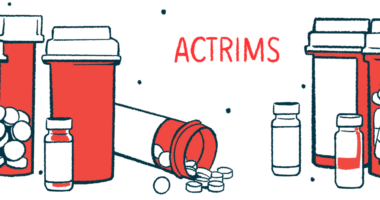Long-term Zeposia May Help Cognitive Function in Patients, Data Show

Long-term treatment with Zeposia (ozanimod) stabilizes or even improves cognitive function in adults with relapsing forms of multiple sclerosis (MS), particularly among those with greater brain volumes.
That’s according to five years of data from the completed SUNBEAM Phase 3 clinical trial (NCT02294058) and the ongoing DAYBREAK extension study (NCT02576717).
“Multiple sclerosis can lead to significant, irreversible brain volume loss and decreased cognition if not treated quickly upon diagnosis,” John DeLuca, PhD, senior vice president for research and training at the Kessler Foundation who was involved in the new analysis, said in a press release from Bristol Myers Squibb, which markets the therapy.
“These new analyses show the potential of early treatment with Zeposia to help stabilize and even improve cognition in people with multiple sclerosis with high brain volume, which is important for doctors and people with multiple sclerosis,” added DeLuca, who is also a professor at Rutgers New Jersey Medical School.
Additional results from DAYBREAK also indicated that MS patients on Zeposia were able to mount an effective immune response after receiving an mRNA vaccine for COVID-19.
These findings were shared in a poster and a late-breaking oral presentation at the European Academy of Neurology Congress, held June 25–28, in Vienna and virtually.
Zeposia is an oral therapy that works by “trapping” immune cells in structures called lymph nodes, preventing the cells from getting into the brain and causing MS-driving inflammation. It is approved in the U.S. for relapsing forms of MS, and in Europe and Canada for relapsing-remitting MS with active disease.
These regulatory approvals were based in part on data from the SUNBEAM Phase 3 trial, which demonstrated that one year of treatment with Zeposia outperformed the approved MS therapy Avonex (interferon beta-1a) at reducing relapse rates and brain shrinkage, while improving cognitive function in relapsing MS patients.
Participants completing SUNBEAM and other Zeposia trials could choose to enter the open-label DAYBREAK extension study, in which they are treated with Zeposia at the now-approved dose (0.92 mg/day) for up to seven years.
In the poster “Positive Association Between Baseline Brain Volume and Long-term Cognition in Patients With Relapsing Multiple Sclerosis” (page 458), researchers at Bristol Myers Squibb and other institutions presented results from exploratory analyses of five years of combined data from SUNBEAM and DAYBREAK.
The analyses included the nearly 800 patients with brain MRI data at the start of the SUNBEAM study and who received Zeposia for up to four years in DAYBREAK. About 650 completed the four years of treatment in the extension study.
Results showed that, at SUNBEAM’s start (baseline), patients with larger brain volume — particularly of a brain region called the thalamus — had significantly better cognitive function, as assessed with the Symbol Digit Modalities Test. Thalamic volume loss has been previously linked to cognitive impairment.
This trend persisted over up to five years of treatment throughout SUNBEAM and DAYBREAK, and participants with high baseline thalamic volume were more likely to show stable or improved cognitive function at all evaluated timepoints than those with smaller thalamic volume.
Specifically, at four years into DAYBREAK, nearly 80% of participants with a larger thalamus at baseline showed improved (45.1%) or preserved (34.4%) cognitive function, compared with two-thirds of those with a smaller thalamus (35.6% improved and 30.7% stabilized).
“We’re excited by the potential effect of Zeposia in protecting cognitive function when used early in treatment before brain volume is lost and what it can mean for individuals with relapsing multiple sclerosis,” said Jonathan Sadeh, MD, senior vice president of BMS’ immunology and fibrosis development.
In a separate presentation at the congress, researchers shared data on responses to completed COVID-19 vaccination among 109 DAYBREAK participants.
Out of 80 patients who received a full course of mRNA-based vaccines (such as those by Pfizer or Moderna), all showed seroconversion — meaning they were producing antibodies able to fight the virus that causes COVID-19. In turn, seroconversion was detected in 62% of the 29 patients given non-mRNA vaccines.
“While more research is required, these data … demonstrate that individuals receiving Zeposia for multiple sclerosis mount a measurable antibody response to COVID-19 vaccination,” Sadeh said in a separate Bristol Myers press release.
The findings suggest that Zeposia-treated patients “are much more likely to develop antibody responses to RNA vaccines compared to non-RNA vaccines,” said Bruce Cree, MD, PhD, one of the study’s researchers and a professor at the University of California San Francisco (UCSF).
“This observation may be helpful for physicians as they seek to optimize care for patients in the face of the ongoing COVID-19 pandemic,” added Cree, who is also the clinical research director of UCSF’s MS Center.
Results from another COVID-19-related analysis of DAYBREAK data were presented earlier this month at the 2022 annual meeting of the Consortium of Multiple Sclerosis Centers.
Scientists looked at the outcomes of 160 confirmed and 30 suspected COVID-19 infections that were documented as of May 2021 — accounting for 8.7% of 2,181 participants analyzed.
They found that the vast majority of these infections — 92.6% — were nonserious, and three COVID-19-related deaths were reported. Most (62.6%) of the patients who had COVID-19 continued to take Zeposia uninterrupted, and 95% recovered without sequelae (aftereffects). No patient has stopped treatment due to COVID-19.
“The benefit:risk profile of [Zeposia] remains unchanged with most COVID-19 cases being non-serious, and the majority resolving without treatment interruption,” the researchers concluded.








